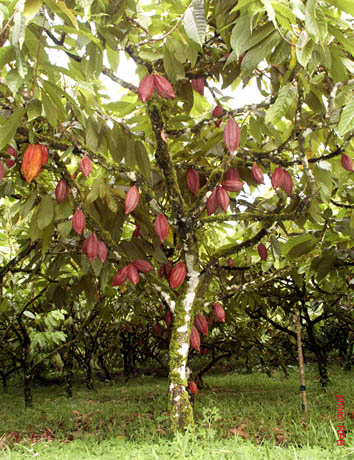Nature's Manufacturer of the "Food of the Gods!"
You say chocolate, I say chocolát...
|
Domain |
Eukarya | Nuclear envelope with two membranes, membrane bound organelles, nucleus, cytoskeleton |
| Kingdom | Plantae | Include plants, red algae and green algae, usually autotrophic via photosynthesis, exhibit alternation of generations |
| Phylum | Magnoliophyta | Angiosperms, seeds are covered, produce flowers and fruits, dominant sporophyte |
| Class | Magnoliopsida | Dicotyldedons, vascular bundles usually born in a ring around pith, most have a primary root system derived from radicle |
| Order | Malvales | Cortex made of fiber, sepals united at base |
| Family | Sterculiaceae | Presence of star-shaped stellate hairs, stipules shed early, about 1000 species |
| Genus | Theobroma | Bisexual flowers, large fruit, tropical small understory trees |
| Species | Theobroma cacao | Cauliflorous (flowers and fruits grow directly from branches and trunk), fruits large and colorful, branches wide, source of chocolate |
|
The scientific name of the cacao tree is Theobroma cacao, translating to "food of the gods" in English. The classification of the chocolate tree is complicated by its origin. No one seems to be sure of when cacao first cultivated or where. This creates inconsistencies in biologists' opinions of which trees are more closely related. The most popular opinion seems to be that there are two subspecies of cacao called Criollo and Forastero. Some believe the two originated separately, while others argue that Forastero is a cultivated form of Criollo. This information is unclear because humans began farming cacao during the Mayan civilization, thousands of years ago. To learn more about cacao's amazing past see the History page.
A third form of cacao, Trinitario, originated as a hybrid of Criollo and Forastero. A common story told about this creation gives insight into the trees name. According to the story, a hurricane hit Trinidad and all of the Criollo were thought to be wiped out. The island was then replanted with Forastero, prompting the creation of the hybrid Trinitario. |
To see a classification tree of Theobroma cacao and some of its relatives, click here.
I created the classification tree above
based on information gathered about some of the more recognizable relatives of cacao. There are around 22 species of Theobroma, none of which are commonly known. Because of this and because of the lack of information available about these species, I chose not to list them. To see a list of Theobroma species and some of their subspecies check out http://www.zipcodezoo.com/Key/Theobroma_Genus.asp
Copyright © 2007, Design by: Sunlight webdesign
